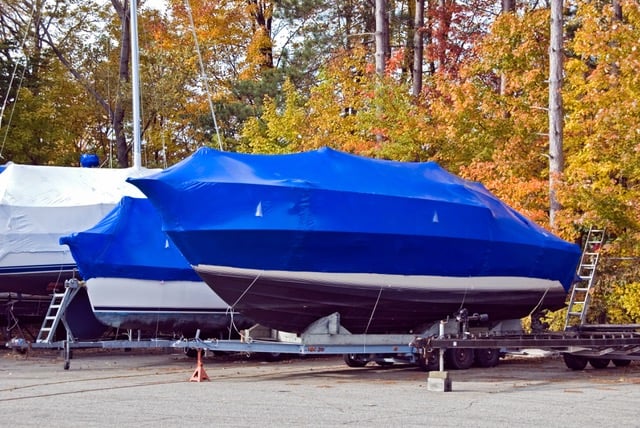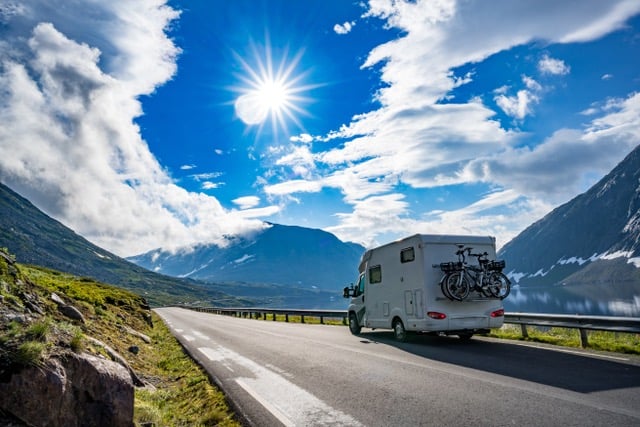With Labor Day now in the rearview, it’s time to start preparing your RV or boat for cooler temperatures. Moving your favorite summer recreation vehicles to a dedicated RV and boat storage unit or parking space for the winter provides you with peace of mind during the offseason, as well as giving you more space at home. Follow our seasonal RV and boat storage tips to help protect your adventure vehicles while storing at the Security Public Storage facility nearest you.
Boat and RV Storage Tips
Start properly preparing your car, RV, boat and jet skis for storage during the winter months.
1. Clean Your RV or Boat —Deep cleaning your vehicle inside and out before putting it in storage helps prevent corrosion. Clean the interior to remove all food and crumbs in order to deter any pests. Defrost and thoroughly clean the refrigerator in RVs to prevent humidity and mildew. Wash the exterior of your RV or boat to prevent damage to the paint from things like bird droppings or water stains. Consider applying a coat of wax for an extra layer of protection.
2. Get an Oil Change and Top Off Fluids —While storing your RV or boat, you want to protect the engine. Over time, the oil in your vehicle starts to collect contaminants such as water and acids. Coolant helps ensure that the water in your vehicle doesn’t get too hot or too cold. Fill your coolant reservoir before storing your RV or boat for the winter in order to prevent damage to your systems. Change your oil at the end of the season before moving into storage. This will be one less chore to take care of when removing your RV or boat from storage next spring or summer.
3. Cover Your Vehicle for Outdoor Storage —There are a variety of options to choose from when considering storage for your RV, boat, motorcycle or jet skis. If you opt for uncovered outdoor storage, consider covering your vehicle with a weather-proof cover. Covers help protect your RV or boat from ultraviolet (UV) rays that can damage the paint finish. Using a cover can be useful in resisting wind damage, tree sap, rain, sleet and snow. Avoid using a plastic tarp, as it may trap moisture between the vehicle and the tarp.
4. Disconnect and Remove the Battery — RV andboat batteries should be disconnected and stored in a dry and cool, but not cold, place. Disconnecting your battery helps prevent it from dying over the winter months while it’s inactive. Batteries will lose some of their charge in storage, but the cool temperature will minimize the loss. Check your battery charge every four to six weeks, and charge as necessary in order to keep it fully charged. Partially charged batteries are more prone to freeze than fully charged ones. Freezing temperatures can damage or destroy batteries.
5. Fuel Up —When preparing to move your RV or boat to storage for the winter season, remember to top it off with fuel to prevent condensation from forming. Consider adding a fuel stabilizer when filling up your tank, following the manufacturer’s recommendations. Let the vehicle run after the tank is full and the stabilizer has been added long enough for them to mix together. Fuel stabilizer helps minimize condensation and can prevent chemical breakdown over time.
6. Protect Your Tires — Tires can also be susceptible to damage from UV rays. Protect your tires with covers designed to fit them properly. Additionally, inflate all of the tires to the pressure indicated on the sidewalls before moving into storage. Check tires and inflate them again before removing your boat or RV from storage, as they may lose pressure during storage.
7. Remove Propane — Turn off your propane tank and remove it from your RV or boat when preparing to move them into seasonal storage. Use caps for your propane lines to prevent anything from getting inside. Store propane tanks in a dry, well-ventilated area.

Choose between Covered, Indoor and Outdoor RV and Boat Storage
Outdoor enthusiasts and adventurers have an array of storage options available for RVs and boats. Indoor storage varies depending on the facility and the size of the storage units available. Indoor storage provides renters with the best protection from the elements. Depending on the climate, we often recommend indoor climate-controlled storage units for boat storage to help prevent the growth of mold and mildew.
Outdoor RV storage options range from open parking spaces to covered vehicle parking, which provides more protection from the elements. Covered parking spaces feature metal roofs that offer some shelter from the sun, rain, sleet and snow. If you choose outdoor storage, we recommend getting a cover for your vehicle as an extra layer of protection. Storage options vary at each facility.
Prepare for Cooler Temperatures
Both RV and boat storage help protect your investment during the off-season. Follow our boat and RV storage tips before moving into your space for the winter. You’ll be relieved by how easy it will be to get back on the road or into the water when the warm weather returns.
